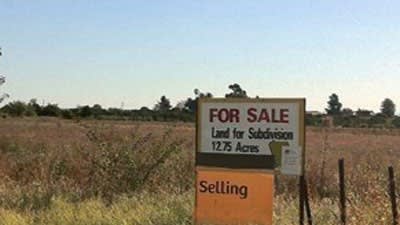Residential developers landbanking denial
Property developer Australand has denied claims it ranks among Australia's leading residential landbankers – a claim made after a study of housing lots around Australia undertaken by activist website, Prosper.
The property developer had less than 8.5 years of supply compared with 19.2 years estimated by Prosper, Australand advised Property Observer who sought a response from all seven leading developers.
The overall claim of land banking went un-rebutted by the six other publicly listed developers.
Prosper claimed Australian land developers were holding onto land and thereby keeping or pushing up residential land prices.
Using data from the company annual reports, Prosper's study endeavoured to calculate total lots held by developers divided by the amount sold over a recent twelve month period to arrive at their conclusion.
Prosper concludes that “this selfishness can be changed by astute application of land tax. Broadacre land zoned residential ought be taxed as if it were already in use.”
However their approach - which found an average of 18.4 years of supply per developer - was labelled as overly simplistic by industry participants.
The McKell Institute advised Property Observer that they had endeavoured to undertake a similar study but concluded they couldn't get access to all the requisite data to make conclusions with confidence.
“I would not know where to start in picking this apart - the land development industry is far, far more complex than this simplistic analysis suggests!!!” commented one industry expert.
“The subject at hand - affordable land supply - involves a significant and complex matrix of issues such as regulatory intervention, delivery timeframes, and infrastructure coordination…not to mention commercial realities including financing, costs and risks.” the Housing Industry of Australia (HIA) chief economist, Harley Dale told Property Observer.
Australand was the only developer to actually rebut the figures in the Prosper article, while Stockland gave a response on the complexities of development.
The amended figures received were quite different to Prosper's as the lots sold were 2,536 as opposed to 1108 as mentioned in the article which severely effected the calculation of years of supply and as a result Australand had around 8.5 years of supply compared with 19.2 as claimed by Prosper.
Stockland gave Property Observer a brief response outlining the complexities of development and the time required to ensure a project is completed at a high standard. The Peet spokesperson said the "issue is quite a complicated one."
“As part of our approach to developing sustainable residential communities, we schedule development to ensure local private and public infrastructure, including transport, telecommunications, energy and water supply is available to meet the growing numbers of residents in each community.” Stockland representative.
Lend Lease had no opinion on the matter, and the remaining developers did not offer any response.
Following the late 2012 publication of the article by Prosper the claim of landbanking did not prompt any response from the seven developers to Prosper.
“The nil response from developers and real estate lobbyists was an insight in itself… their silence in response to this was deafening,“ commented David Collyer, the author of the Prosper article.
Prosper argue that taxing rezoned ready to sell land would speed up the turnover of land from paddock to subdivision.
But Angie Zigomanis from BIS Shrapnel told Property Observer "a land tax for zoned land may also encourage developers to turn over their land quicker if they are holding zoned land. If more land is forced onto the market in a corridor, then it could also result in price competition.”
However, Mr. Zigomanis believe there may be some “unintended consequences” as developers would delay rezoning land to save on tax, potentially placing supply pressures and driving up prices.
"It is clear that the topic of land banking is far more complex than the Prosper article defines it.
"Simply resolving the issue with higher taxes will only increase the cost of the development, which in turn is passed onto the purchaser.
"In circumstances where developers are competing on price, it could impact on the type and quality of the product being offered,” commented Mr Zigmomanis.
Colin Keane at Research4 says any high level of supply did not suggest that developers were holding back producing new lots, but rather have continued to produce more land parcels in the face of weakening sales.
He says the current lower than expected sale rate has nothing to do with supply levels but more to do with an array of issues impacting on price, location of supply, drivers of demand and production capability.
"Taking the price issue, some would say that the industry is experiencing lower sale rates because the price is too high.
"The price points for land is a factor in deterring potential customers, however to blame it on “land banking” would once again be inaccurate."
Keane maintains the volume of land under control by the major developers is small - and not enough to influence pricing strategy across the market.
